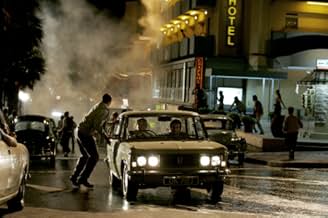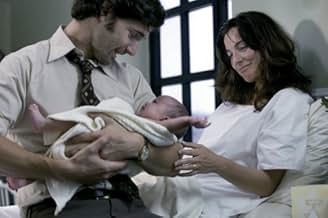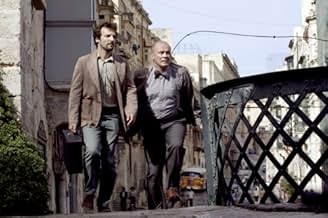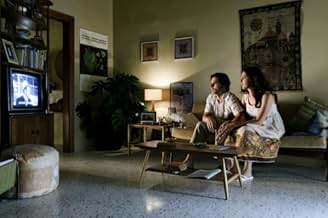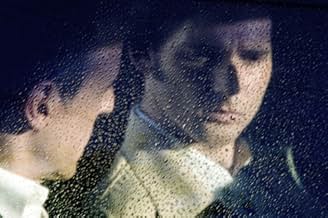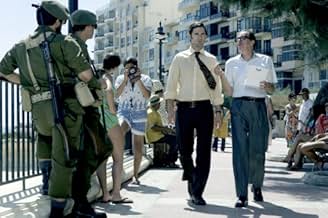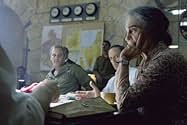Munich
After the Black September capture and massacre of Israeli athletes at the 1972 Olympics, five men are chosen to eliminate the people responsible for that fateful day.After the Black September capture and massacre of Israeli athletes at the 1972 Olympics, five men are chosen to eliminate the people responsible for that fateful day.After the Black September capture and massacre of Israeli athletes at the 1972 Olympics, five men are chosen to eliminate the people responsible for that fateful day.
- Director
- Writers
- Stars
- Nominated for 5 Oscars
- 14 wins & 75 nominations total
Marie-Josée Croze
- Jeanette the Dutch Assassin
- (as Marie-Josee Croze)
Valeria Bruni Tedeschi
- Sylvie
- (as Valéria Bruni Tedeschi)
Amos Lavi
- General Yariv
- (as Amos Lavie)
- Director
- Writers
- All cast & crew
- Production, box office & more at IMDbPro
Featured reviews
Ever since he has journeyed into serious films (starting with "Empire of the Sun" and then "Schindler's List"), Steven Spielberg has been searching for a method of making violence unattractive to moviegoers. "Schindler's List" was, of course, shocking, but this first attempt at strong violence did not quite have the intended effect. I know that a lot of people (including me) feel saddened by the film, but SL's violence could seem distant at times, like the audience was merely an observer. "Saving Private Ryan" was the second great attempt at making moviegoers detest violence, but this seemed easily dismissed as a war film, showing events that would probably never happen again, like showing violence in a distant universe. Munich is his latest effort, and it shows Spielberg's feeling that his previous films, although progressive, had not quite 'hit the mark'.
The violence shown in Munich is, perhaps, the most brutal realistically intentioned violence ever shown on film. I say 'realistically intentioned' because, like the average moviegoer, I have not witnessed people getting shot or blown up, so I don't know what those events would actually look like. There are many signs in the film that Spieberg is trying to improve on his earlier efforts. The guns in the film are REALLY loud when fired. This has the effect of putting you in the fight, making it more intimate when someone IS shot. The bullet wounds and remains after explosions are quite gruesome. When someone dies in this film, no matter what side they are on, you feel no happiness, no relief or awe. You feel a sense of death, nothing dramatic, just blank and empty. For this reason, Munich is one of the most important films to have come out, and perhaps it is Spielberg's best ('Raiders' is too superhuman to be included on that list). Spielberg deserves the best director for this one.
The violence shown in Munich is, perhaps, the most brutal realistically intentioned violence ever shown on film. I say 'realistically intentioned' because, like the average moviegoer, I have not witnessed people getting shot or blown up, so I don't know what those events would actually look like. There are many signs in the film that Spieberg is trying to improve on his earlier efforts. The guns in the film are REALLY loud when fired. This has the effect of putting you in the fight, making it more intimate when someone IS shot. The bullet wounds and remains after explosions are quite gruesome. When someone dies in this film, no matter what side they are on, you feel no happiness, no relief or awe. You feel a sense of death, nothing dramatic, just blank and empty. For this reason, Munich is one of the most important films to have come out, and perhaps it is Spielberg's best ('Raiders' is too superhuman to be included on that list). Spielberg deserves the best director for this one.
7e-20
Munich is a well crafted film by the biggest director on the planet. Great pacing, suspense and cinematography. The biggest problem I had with the film is that I've seen it before. A little known film called THE SWORD OF GIDEON. Munich is almost a direct copy from the original. What a shame that Spielberg has to produce a remake of a much better film. Enough already with the remakes. People want to see original stories with fresh new ideas and writers. Why are independent films so successful, because the ones that are well made and tell a good story are box office darlings. It's amazing some Hollywood films have budgets north of 100 million. Just incredible how much money and time is wasted. If you want to understand what happened in the aftermath of Munich, rent THE SWORD OF GIDDEON.
Munich may just be Spielberg's greatest accomplishment ever and it isn't a sweeping epic like you'd expect, but a patient psychological thriller that sneaks up on you and takes you and shakes you. It not shy away from blood, politics or nudity in its portrayal of events and this makes it extremely intense, absorbing and occasionally very violent.
The first half of Münich is not altogether different from a heist drama; a group of diverse men with different skills team up to accomplish a mission. They get to travel across Europe, make deals, infiltrate suspect facilities and manufacture explosive devices. Unlike heist films, however, their mission is not for personal gain, but for the government. They are to assassinate eleven Arabs who were alleged to be behind terrorist attacks like Münich 1972. So the more accessible part of the film sees Bana and his men botch their way through a hit-list as inexperienced hit-men, fumbling and trembling with the weight of this somber new task.
This part is so extraordinarily well-handled and engaging with a tone so tense and shadowed by politics and ethical dilemmas that every slight pause is mistaken for humour. It is also an excellent portrayal of an era - the 1970s - with great eye for detail, all carefully sewn together by a master tailor (Spielberg). It is a fantastic piece of film-making.
While Munich keeps you interested throughout, it gradually loses its fresh thriller edge by opting for more typical scenarios. Eric Bana's character goes through emotional struggles because he finds it too hard to kill people. He thinks about his family--his wife has just had a baby girl. He wonders if he is doing the right thing. He starts sympathizing with the Arabs. He wonders if they killings will stop once he has completed his mission. Everything is classic and you saw it coming. It needs to be present in the film for a balanced portrayal but the hackneyed formula with which it is expressed is disappointing. It started so promising, after all.
Sadly, the culmination of this slightly hackneyed recipe manifests itself in the final scene of the film and it is absolutely dreadful and drags the whole film down by at least one star - but overall this is superb quality that is carried by a strong ensemble cast (Geoffrey Rush, Daniel Craig) although it is ultimately Bana's show. He captures the inner turmoil and hesitation of his character in the most believable way, making Munich into a worthwhile adventure for its performances alone. But most importantly, it dares to asks questions.
8/10
The first half of Münich is not altogether different from a heist drama; a group of diverse men with different skills team up to accomplish a mission. They get to travel across Europe, make deals, infiltrate suspect facilities and manufacture explosive devices. Unlike heist films, however, their mission is not for personal gain, but for the government. They are to assassinate eleven Arabs who were alleged to be behind terrorist attacks like Münich 1972. So the more accessible part of the film sees Bana and his men botch their way through a hit-list as inexperienced hit-men, fumbling and trembling with the weight of this somber new task.
This part is so extraordinarily well-handled and engaging with a tone so tense and shadowed by politics and ethical dilemmas that every slight pause is mistaken for humour. It is also an excellent portrayal of an era - the 1970s - with great eye for detail, all carefully sewn together by a master tailor (Spielberg). It is a fantastic piece of film-making.
While Munich keeps you interested throughout, it gradually loses its fresh thriller edge by opting for more typical scenarios. Eric Bana's character goes through emotional struggles because he finds it too hard to kill people. He thinks about his family--his wife has just had a baby girl. He wonders if he is doing the right thing. He starts sympathizing with the Arabs. He wonders if they killings will stop once he has completed his mission. Everything is classic and you saw it coming. It needs to be present in the film for a balanced portrayal but the hackneyed formula with which it is expressed is disappointing. It started so promising, after all.
Sadly, the culmination of this slightly hackneyed recipe manifests itself in the final scene of the film and it is absolutely dreadful and drags the whole film down by at least one star - but overall this is superb quality that is carried by a strong ensemble cast (Geoffrey Rush, Daniel Craig) although it is ultimately Bana's show. He captures the inner turmoil and hesitation of his character in the most believable way, making Munich into a worthwhile adventure for its performances alone. But most importantly, it dares to asks questions.
8/10
10mlg-2
I am not a big Spielberg fan, and find he often goes for cheap emotional manipulation in his films, especially his endings. I was there fore amazed at the unflinching control he exercised in Munich, his utter unwillingness to flinch at complexities, his ability to dissect the ideological and moral sureties of all sides within the natural rhythms of the thriller genre. There is so much to praise in this film, because it is utterly seamless film-making with a keen eye for every little detail that never reveals the intense precision behind its construction.
While some have found the film "disengaged," I found that it pulled at the viewer's conscience through the central characters, not only Bana's Israeli agent Avner and his cohorts, most of who slowly find themselves gnawed by doubts of their mission's morality and effectiveness, but also smaller characters as well, drawn with indelible deftnessthe weary ex-French Resistance fighter now a trader in deadly information to stateless agents because of his cynicism about recurrent corrupt regimes replacing each other, or the PLO operative who debates Palestinian strategy and justification with Avner, who he wrongly believes to be a German left-wing terrorist who is "soft" on Jews because of the Holocaust. The economy of Spielberg's film-making is breathtaking in hindsight, so that what at first seems a relatively flat and emotionless exercise in historical recreation slowly seeps into one's subconscious and then moves upward, in quick bursts of sudden bursts of emotional and intellectual recognition by the viewer. These are real human beings, these are fighters in a war they believe in desperately and whose people have suffered terribly yet can find no real peace.
For this Kushner and Roth's screenplay must get much credit, the crisp narrative development intertwined with intellectually rigorous set pieces and flat-out armrest-clutching actions sequences. John Williams, who has managed to be understated in the past, is equally adept at building (or feinting) tension and subtly commenting on character development. Check out the slightly dissonant piano in the last scene to see what I mean. Longtime Spielberg collaborator Janusz Kaminski creates some amazing framing devices, especially as the action sequences are about to unfold and during moments of intimate conversations imbued with tension. Michael Kahn's editing is crisp and occasionally startling, as in the way the conclusion of the horrifically bungled Munich "rescue" is related. The retelling of the entire event from break-in to conclusion is doled out in bits and pieces in what seems at first an attempt to soften its impact but in the end, entwined as it is with all of the complicated issues, is finally revealed as a masterful means of achieving the fully deserved emotional impact within a complexly rendered ideological, moral and strategic matrix. There is not a false note in any of the acting, and the casting is uniformly spot-on.
About the politics. The radicals on either side will reject the film out of hand because it dares to render both sides as human and worthy of understanding. But attempting to understand choices of violence and vengeance as strategies does not in any way mean condoning them. Certainly, anyone who feels that the film somehow allows a viewer to walk away thinking that Black September was justified in its attack is probably projecting his or her fears about how some imagined uninformed viewer might react. Instead, the film demonstrates that whether one feels either or both sides justified it doesn't mannerneither side can win through violence at this point. This was Yitzhak Rabin's great insightyou don't make peace with your friends, you make peace with your enemies. His Israeli Jewish murderers wanted violence to continue, believing that only a continued state of war would keep Israel from giving back land they saw as bound up with their faith but which international law, historical study and the basic "facts on the ground" reveal to be bound to be returned to the Palestinians. Ariel Sharon, of all people, came to understand this, though without the larger vision and magnanimity of spirit that his fellow warrior Rabin discovered. Spielberg's message is clearthe extremists will choose war over peace, but must so many of us side with the extremists because of our fear of appearing weak or "giving in"? A last note on politicsthere is clear relevance to the United States' current predicament post-9/11. One can almost here Cheney or Bush making the speech made by Israeli premier Golda Meir in the film (an extraordinary piece of recreation that transcends mere imitation), only probably with more moral surety and less sense of resignation. Anyone paying attention to world reaction to Guantanimo, Abu Gharib, the bombing of Afghan and Iraqi villages and the spiriting away of suspected terrorists through "rendition" for torture in "friendly" nations must be aware that whether one leans hard or soft on such matters, there is going to be a price to be paid. The hardliners believe we will just keep punching and slugging and eventually the bad guys will go down; that they will not reproduce themselves like the many-headed Hydra or germinate and reproduce by the thousands in the fetid waters of our perceived hypocrisywhether you think it justified or not it doesn't matter. As Spielberg makes clear in this film, all that matters in the end is peace or violence, and whoever ultimately desires the former had better be damn sure that their use of the latter is measured by the awareness that it use will create debts that will need to be repaid in the end, and the debtors will most likely be the generations to come on all sides.
While some have found the film "disengaged," I found that it pulled at the viewer's conscience through the central characters, not only Bana's Israeli agent Avner and his cohorts, most of who slowly find themselves gnawed by doubts of their mission's morality and effectiveness, but also smaller characters as well, drawn with indelible deftnessthe weary ex-French Resistance fighter now a trader in deadly information to stateless agents because of his cynicism about recurrent corrupt regimes replacing each other, or the PLO operative who debates Palestinian strategy and justification with Avner, who he wrongly believes to be a German left-wing terrorist who is "soft" on Jews because of the Holocaust. The economy of Spielberg's film-making is breathtaking in hindsight, so that what at first seems a relatively flat and emotionless exercise in historical recreation slowly seeps into one's subconscious and then moves upward, in quick bursts of sudden bursts of emotional and intellectual recognition by the viewer. These are real human beings, these are fighters in a war they believe in desperately and whose people have suffered terribly yet can find no real peace.
For this Kushner and Roth's screenplay must get much credit, the crisp narrative development intertwined with intellectually rigorous set pieces and flat-out armrest-clutching actions sequences. John Williams, who has managed to be understated in the past, is equally adept at building (or feinting) tension and subtly commenting on character development. Check out the slightly dissonant piano in the last scene to see what I mean. Longtime Spielberg collaborator Janusz Kaminski creates some amazing framing devices, especially as the action sequences are about to unfold and during moments of intimate conversations imbued with tension. Michael Kahn's editing is crisp and occasionally startling, as in the way the conclusion of the horrifically bungled Munich "rescue" is related. The retelling of the entire event from break-in to conclusion is doled out in bits and pieces in what seems at first an attempt to soften its impact but in the end, entwined as it is with all of the complicated issues, is finally revealed as a masterful means of achieving the fully deserved emotional impact within a complexly rendered ideological, moral and strategic matrix. There is not a false note in any of the acting, and the casting is uniformly spot-on.
About the politics. The radicals on either side will reject the film out of hand because it dares to render both sides as human and worthy of understanding. But attempting to understand choices of violence and vengeance as strategies does not in any way mean condoning them. Certainly, anyone who feels that the film somehow allows a viewer to walk away thinking that Black September was justified in its attack is probably projecting his or her fears about how some imagined uninformed viewer might react. Instead, the film demonstrates that whether one feels either or both sides justified it doesn't mannerneither side can win through violence at this point. This was Yitzhak Rabin's great insightyou don't make peace with your friends, you make peace with your enemies. His Israeli Jewish murderers wanted violence to continue, believing that only a continued state of war would keep Israel from giving back land they saw as bound up with their faith but which international law, historical study and the basic "facts on the ground" reveal to be bound to be returned to the Palestinians. Ariel Sharon, of all people, came to understand this, though without the larger vision and magnanimity of spirit that his fellow warrior Rabin discovered. Spielberg's message is clearthe extremists will choose war over peace, but must so many of us side with the extremists because of our fear of appearing weak or "giving in"? A last note on politicsthere is clear relevance to the United States' current predicament post-9/11. One can almost here Cheney or Bush making the speech made by Israeli premier Golda Meir in the film (an extraordinary piece of recreation that transcends mere imitation), only probably with more moral surety and less sense of resignation. Anyone paying attention to world reaction to Guantanimo, Abu Gharib, the bombing of Afghan and Iraqi villages and the spiriting away of suspected terrorists through "rendition" for torture in "friendly" nations must be aware that whether one leans hard or soft on such matters, there is going to be a price to be paid. The hardliners believe we will just keep punching and slugging and eventually the bad guys will go down; that they will not reproduce themselves like the many-headed Hydra or germinate and reproduce by the thousands in the fetid waters of our perceived hypocrisywhether you think it justified or not it doesn't matter. As Spielberg makes clear in this film, all that matters in the end is peace or violence, and whoever ultimately desires the former had better be damn sure that their use of the latter is measured by the awareness that it use will create debts that will need to be repaid in the end, and the debtors will most likely be the generations to come on all sides.
Just because this film has been attacked by pols and shills, here's my 2 cents. Spielberg manages to set the agenda, and sets it correctly. It is indeed about the antecedents to 9/11, and bravo to Spielberg for taking it on, but not somewhere in Afghanistan, but at its genesis, the squalor of Palestine.
Spielberg's film is an essay on revenge and how hopeless and self-defeating that ancient temptation is. It's brave of Spielberg to say it to us now; brave, too, to paint the avenging Israelis as somewhere below the Angels. Let's be candid: There are harsh sentiments expressed here, by some Israeli characters, that the Evangelical Lobby simply doesn't want aired.
Spielberg's handling of the Bana character is masterful. Noteworthy is how uncompromising it is: this is a man whose identity has collapsed. It's entirely right that his Israeli handler should refuse the Sabbath-meal invitation at the end, realizing that the bonds of the older religion (and pre-Zionist identity) are shattered and meaningless.
Spielberg might have improved this product (some of the dialogues are horribly wooden). But that's not important. That a mainstream US film should go where this film goes is significant. This is a major-minor event in Spielberg's long and luminous career.
Spielberg's film is an essay on revenge and how hopeless and self-defeating that ancient temptation is. It's brave of Spielberg to say it to us now; brave, too, to paint the avenging Israelis as somewhere below the Angels. Let's be candid: There are harsh sentiments expressed here, by some Israeli characters, that the Evangelical Lobby simply doesn't want aired.
Spielberg's handling of the Bana character is masterful. Noteworthy is how uncompromising it is: this is a man whose identity has collapsed. It's entirely right that his Israeli handler should refuse the Sabbath-meal invitation at the end, realizing that the bonds of the older religion (and pre-Zionist identity) are shattered and meaningless.
Spielberg might have improved this product (some of the dialogues are horribly wooden). But that's not important. That a mainstream US film should go where this film goes is significant. This is a major-minor event in Spielberg's long and luminous career.
Did you know
- TriviaGuri Weinberg played his own father. He is the son of Moshe Weinberg, the Israeli wrestling referee and former champion, who died in the massacre when Guri was just one month old.
- GoofsThough they took the time to digitally add the World Trade Center to the final shot, they didn't edit out the Citigroup Center, Trump World Tower, and the Bloomberg building, which were built after the time of the movie.
- Alternate versionsThe film was heavily censored in Malaysia for a 'U' rating. The uncut version is rated '18PL'.
- ConnectionsFeatured in Today: Episode dated 27 July 2005 (2005)
- SoundtracksAin't No Sunshine
Written & Performed by Bill Withers
Courtesy of Columbia Reecords
By Arrangement with Sony BMG Music Entertainment
Details
- Release date
- Countries of origin
- Languages
- Also known as
- Untitled 1972 Munich Olympics Project
- Filming locations
- Bugibba, Malta(Olympic Hotel in Cyprus)
- Production companies
- See more company credits at IMDbPro
Box office
- Budget
- $70,000,000 (estimated)
- Gross US & Canada
- $47,403,685
- Opening weekend US & Canada
- $4,152,260
- Dec 25, 2005
- Gross worldwide
- $130,982,407
- Runtime
- 2h 44m(164 min)
- Color
- Sound mix
- Aspect ratio
- 2.35 : 1
Contribute to this page
Suggest an edit or add missing content


